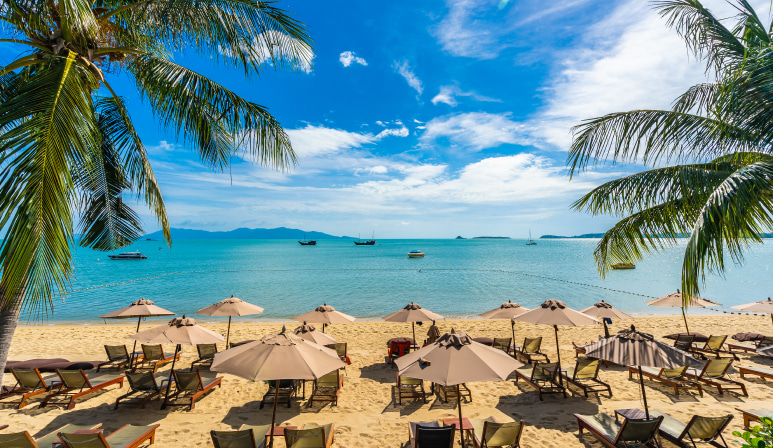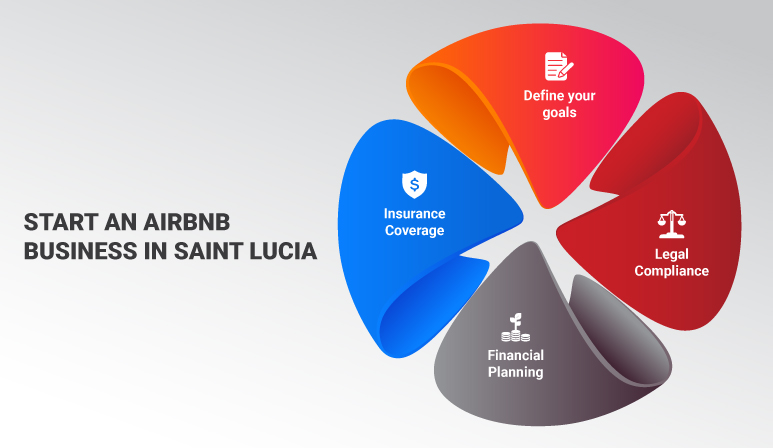In the heart of the Caribbean, St. Lucia boasts a thriving tourism industry, drawing visitors with its breathtaking landscapes and vibrant culture. Amidst this tourism boom, the Airbnb business model has emerged as a compelling entrepreneurial avenue. This article explores the burgeoning opportunities for those looking to start an Airbnb business in St. Lucia. From understanding the local market to navigating regulations, discover the key steps to tap into this rising trend and establish a successful hospitality venture in this tropical paradise.
How does Airbnb work in St. Lucia?
Airbnb has become a prominent player in St. Lucia's hospitality landscape, providing both hosts and guests with unique opportunities to engage in the island's vibrant tourism sector. In the local market context, Airbnb serves as an online platform connecting hosts with travelers seeking personalized accommodations. We will find out how Airbnb works in St. Lucia.
1. Platform Dynamics in St. Lucia:
Airbnb's platform in St. Lucia facilitates a direct and user-friendly connection between property owners and potential guests. Hosts can list a variety of accommodations, ranging from cozy apartments to luxurious villas, allowing for a diverse and tailored selection for visitors. The platform's intuitive interface enables hosts to showcase their properties with enticing descriptions, high-quality photos, and transparent pricing.
The local market dynamics play a crucial role, as St. Lucia's tourism sector emphasizes authentic experiences. Airbnb, with its emphasis on unique and culturally immersive stays, aligns perfectly with the island's appeal to travelers seeking more than conventional hotel accommodations. This synergy has contributed to the platform's popularity among both hosts and guests.
2. Key Features and Benefits for Hosts:
- Flexibility and Control: Airbnb provides hosts in St. Lucia with the flexibility to manage their listings, setting their own house rules, availability, and pricing. This autonomy allows hosts to tailor their offerings to match the local demand and individual preferences.
- Global Exposure: One of the standout benefits for hosts is the global exposure Airbnb provides. St. Lucia's hosts can attract guests worldwide, expanding their reach beyond traditional marketing channels and tapping into a diverse pool of potential visitors.
- Host Guarantee and Support: Airbnb offers a host guarantee that provides coverage for property damage, offering a sense of security to hosts. Additionally, the platform provides support services, ensuring that hosts have assistance in case of any issues during a guest's stay.

Airbnb works in Saint Lucia as an online platform connecting hosts with travelers seeking personalized accommodations.
Airbnb works in St. Lucia as a catalyst for local hosts to actively participate in and benefit from the burgeoning tourism industry, offering a dynamic and mutually rewarding platform for both hosts and visitors.
Requirements and Regulations for Starting an Airbnb business in St. Lucia
Embarking on an Airbnb business journey in St. Lucia requires careful navigation of legal considerations and adherence to specific regulations. Understanding the legal landscape is crucial for hosts to operate seamlessly and sustainably in this burgeoning market.
1. Legal Considerations for Starting an Airbnb Business:
- Zoning Regulations: Before listing a property on Airbnb, hosts in St. Lucia must be aware of local zoning regulations. Some areas may have restrictions on short-term rentals, and hosts should ensure that their property complies with these zoning laws to avoid legal complications.
- Tax Obligations: Hosts are typically responsible for collecting and remitting certain taxes associated with their Airbnb rentals. Understanding the tax obligations, such as value-added tax (VAT) or occupancy taxes, is imperative to ensure compliance with St. Lucia's tax laws.
- Property Ownership and Permissions: Hosts should verify that they have the legal right to rent out their property. If the property is leased, hosts must ensure that the lease agreement allows for short-term rentals. Property owners may need to obtain consent from landlords or homeowners' associations.
2. Overview of Licensing and Regulatory Requirements:
- Tourism Authority Approval: St. Lucia's Tourism Authority may require hosts to obtain approval or a license before operating an Airbnb business. This process often involves submitting necessary documentation, ensuring the property meets safety standards, and adhering to specific criteria set by the tourism authorities.
- Health and Safety Standards: To ensure the well-being of guests, hosts must comply with health and safety standards. This may include having fire safety measures in place, providing emergency information to guests, and meeting sanitation requirements.
- Insurance Coverage: Hosts are encouraged to obtain adequate insurance coverage for their Airbnb properties. This may include liability coverage to protect against potential accidents or damages that may occur during a guest's stay.
3. Compliance with Local Laws and Regulations:
- Noise and Nuisance Regulations: St. Lucia, like many destinations, may have regulations governing noise levels and disturbances. Hosts should communicate clear guidelines to guests regarding noise restrictions to maintain harmony with neighbors and local communities.
- Anti-Discrimination Laws: Hosts must be aware of and comply with anti-discrimination laws when accepting bookings. It is essential to treat all guests fairly and ensure that listing descriptions and communication do not violate any discrimination laws.
- Data Protection and Privacy: St. Lucia may have specific regulations regarding data protection and privacy. Hosts should be mindful of collecting and handling guest information responsibly to comply with these laws.

Understanding the legal landscape is crucial for hosts to operate seamlessly and sustainably
A successful Airbnb business in St. Lucia requires hosts to meticulously navigate legal considerations, obtain necessary licenses, and ensure compliance with local regulations. By doing so, hosts can build a reputable and sustainable business while contributing positively to the island's thriving tourism sector.
How to Start an Airbnb Business in Saint Lucia
Starting an Airbnb business in St. Lucia requires a strategic approach that encompasses thorough research, effective market analysis, and the creation of a compelling property listing. Additionally, setting competitive pricing strategies is pivotal for attracting guests while ensuring profitability.

Starting an Airbnb business in St. Lucia requires a strategic approach
1. Step-by-Step Guide to Initiating an Airbnb Business:
- Define your goals: Clearly articulate your goals for starting an Airbnb business in St. Lucia. Whether it's generating supplemental income or creating a full-fledged hospitality enterprise, having a clear vision will guide your decisions throughout the process.
- Legal Compliance: Begin by understanding and complying with legal requirements. Research zoning laws, licensing regulations, and any other legal considerations that may apply to short-term rentals in St. Lucia. This foundational step ensures a solid legal framework for your business.
- Financial Planning: Develop a comprehensive financial plan that outlines your budget for property setup, maintenance, and marketing. Consider potential expenses such as property improvements, furnishings, utilities, and ongoing operational costs.
- Insurance Coverage: Explore insurance options to protect your property and business. Adequate insurance coverage, including liability insurance, can provide a safety net in case of unforeseen events or damages during a guest's stay.
2. Research and Market Analysis:
- Identify Target Audience: Conduct market research to identify your target audience. Understanding the preferences and expectations of potential guests in St. Lucia will help you tailor your property and services to meet their needs.
- Analyze Local Competition: Assess other Airbnb listings in St. Lucia to understand the competitive landscape. Identify unique selling points for your property and consider how you can differentiate yourself to attract guests.
- Evaluate Seasonal Trends: St. Lucia experiences seasonal variations in tourism. Analyze the demand patterns throughout the year to optimize pricing and marketing strategies accordingly. This insight ensures that your Airbnb business capitalizes on peak seasons.
3. Creating a Compelling Property Listing:
- High-Quality Photos: Invest in photographs of professional caliber that highlight your property in the most favorable way possible. High-resolution images capture the attention of potential guests and contribute to a positive first impression.
- Detailed Property Description: Craft a detailed and engaging property description. Highlight the unique features of your accommodation, local attractions, and any special amenities or services you offer.
- Guest-Focused Amenities: Consider the needs and desires of your target audience. Provide amenities that enhance the guest experience, such as well-equipped kitchens, comfortable bedding, and thoughtful touches that reflect the local culture.
- Clear House Rules: Communicate house rules to guests. Transparency about expectations helps manage guest behavior and ensures a smooth and positive experience for both hosts and visitors.
4. Setting Competitive Pricing Strategies:
- Market-Based Pricing: Regularly review the pricing of comparable listings in St. Lucia. Set your rates based on market trends, adjusting them seasonally or in response to local events and festivals.
- Value-Added Pricing: Consider offering value-added services or amenities to justify higher pricing. This could include complimentary airport transfers, guided tours, or exclusive discounts for local attractions.
- Dynamic Pricing: Implement dynamic pricing strategies that adapt to changes in demand, local events, and seasonal fluctuations. This ensures that your rates remain competitive and reflective of the current market conditions.
- Guest Feedback Integration: Regularly review guest feedback and ratings. Positive reviews can be leveraged to justify higher prices, while constructive criticism provides insights into areas for improvement.
Starting an Airbnb business in St. Lucia involves a systematic approach encompassing legal compliance, thorough research, compelling property listings, and strategic pricing. By following these steps, aspiring hosts can establish a successful and profitable venture in the vibrant tourism landscape of St. Lucia.
How Much Does It Cost to Start an Airbnb Business in St. Lucia?
Starting an Airbnb business in St. Lucia requires a comprehensive understanding of the financial aspects involved, encompassing both initial setup costs and ongoing expenses. From property preparation to maintaining a welcoming environment, hosts need to carefully budget for a successful and sustainable venture. How much does it cost to start an Airbnb business in St. Lucia?
1. Breakdown of Initial Costs:
- Property Setup: The initial cost of starting an Airbnb business in St. Lucia involves preparing the property for guests. This includes any necessary renovations, interior design enhancements, and ensuring that the space is aesthetically pleasing and functional. Depending on the property's condition, these costs can vary significantly.
- Furnishings and Decor: Investing in quality furnishings and decor is crucial to creating an inviting atmosphere. This may include comfortable furniture, stylish decorations, and essential items such as kitchenware and linens. Striking a balance between comfort and aesthetics is key to attracting positive reviews.
- Amenities and Appliances: Providing essential amenities and appliances enhances the guest experience. This could involve investing in modern kitchen appliances, high-quality toiletries, and entertainment options such as a smart TV or high-speed internet. These added conveniences contribute to positive guest reviews and satisfaction.
- Photography: High-quality photos are essential for attracting potential guests. Investing in professional photography to showcase the property accurately and attractively is a worthwhile expense. This cost is crucial as it significantly influences a guest's decision to book.
2. Ongoing Expenses:
- Maintenance: Regular maintenance is essential to keep the property in optimal condition. This includes addressing wear and tear, fixing any issues promptly, and ensuring that all amenities are in working order. Allocating a budget for routine maintenance helps preserve the property's appeal and functionality.
- Utilities: Ongoing utility expenses, such as electricity, water, and internet, are recurring costs that hosts need to account for. Monitoring and managing utility usage efficiently can contribute to cost savings over time.
- Cleaning Services: Maintaining a clean and sanitary environment is critical for guest satisfaction. Hosts may choose to hire professional cleaning services between guest stays. This expense ensures that the property meets cleanliness standards, contributing to positive reviews and repeat bookings.
- Property Management Software: Investing in property management software can streamline operations, including booking management, communication with guests, and financial tracking. While this is not a mandatory expense, it can significantly improve efficiency and the overall guest experience.
- Marketing and Advertising: Hosts may allocate a portion of their budget to marketing and advertising to promote their Airbnb listing. This could involve utilizing online platforms, social media, and even collaborations with local tourism initiatives to increase visibility and attract potential guests.
- Insurance: While insurance may fall under initial costs, ongoing insurance premiums are a recurring expense. Having comprehensive insurance coverage is crucial to protect against unforeseen events, property damage, or liability issues.

Cost analysis: How much does it cost to start an Airbnb business in St. Lucia?
When starting and maintaining an Airbnb business in St. Lucia, business owners need to know how much it costs to start an Airbnb in St. Lucia to set up a careful financial plan. Hosts should anticipate both the initial costs associated with property setup and the ongoing expenses required for continuous maintenance and guest satisfaction. By budgeting effectively, hosts can not only establish a successful Airbnb business but also ensure its long-term viability in the competitive St. Lucian hospitality market.
Venturing into the Airbnb business in St. Lucia requires meticulous planning and adherence to local regulations. By understanding legal considerations, conducting thorough market research, and creating appealing listings, entrepreneurs can establish a successful presence in the thriving hospitality market of St. Lucia. This recap encourages aspiring hosts to seize the opportunities presented by the region's growing tourism industry, paving the way for a lucrative and rewarding Airbnb venture.




